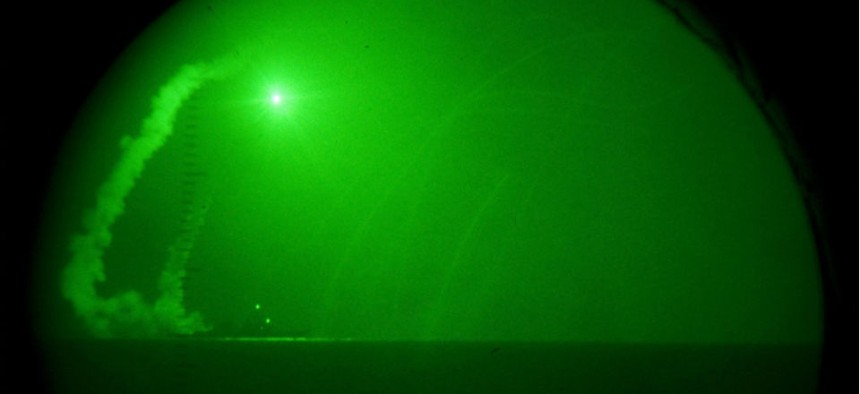
A Tomahawk missile launch in 2011, seen through a night vision lens. The U.S. is using Tomahawk missiles in its strikes against Syria. Petty Officer 1st Class Nathanael Miller/U.S. Navy
The U.S. Military Has Begun Striking ISIS in Syria
Fighters, bombers, remotely piloted aircraft and Tomahawk missiles were used against Islamic State forces in Syria Monday night.
The U.S. military has begun strikes against Islamic State targets in Syria.
"I can confirm that U.S. military and partner forces are undertaking military action against ISIL terrorists in Syria using a mix of fighter, bomber and Tomahawk Land Attack Missiles," Rear Adm. John Kirby announced late Monday night, without providing any more immediate details outside of saying that the "decision to conduct these strikes was made earlier today by the U.S. Central Command commander under authorization granted him by the commander in chief."
U.S. Central Command provided far more detail on the strikes Tuesday morning. Along with Bahrain, Jordan, Saudi Arabia, Qatar, and the United Arab Emirates, the U.S. military conducted 14 strikes on Islamic State targets in Raqqa, Dayr az Zawr, Al Hasakah, and Abu Kamal. According to CENTCOM, the strikes "destroyed or damaged...ISIL fighters, training compounds, headquarters and command and control facilities, storage facilities, a finance center, supply trucks and armed vehicles." The five partner nations "participated in or supported the airstrikes."
You can see video of strikes on ISIS militants in Syria here, released by the Navy early Tuesday.
In addition to the strikes against ISIS, the U.S. military alone ran eight strikes west of Aleppo, Syria against the Khorasan Group, a group of former al-Qaida members that the U.S. considersa more direct threat to the United States and Europe. Those strikes were aimed at "training camps, an explosives and munitions production facility, a communication building and command and control facilities."
Raqqa is considered the Islamic State's "home base," and the operation began without the approval of Syria's Bashar al-Assad. However, according to the Syrian foreign ministry, the U.S.did inform the country's permaneny envoy to the United Nations that the strikes would occur. The U.S. military believes over two-thirds of Islamic State militants to be in Syria. These new attacks also included four strikes against Islamic State targets in Iraq, bringing the total number of U.S. strikes in that country to 194 since August 8.
President Obama will deliver a statement at 10 a.m. Tuesday morning before heading to New York for the United Nations Climate Summit, according to the White House. Last week, Defense Secretary Chuck Hagel told the Senate Armed Services Committee that U.S. Central Command was in the process of "refining and finalizing" a plan for military force in Syria against Islamic State command and control and infrastructure.
Qatar's exact involvement is, so far, still hazy.
Officials said Qatar had signed up but then waived on joining strikes. Officials say Qatar is participating, but not clear how.
— Julian E. Barnes (@julianbarnes) September 23, 2014CNN reports that the strikes are not time-sensitive:
BREAKING: Targets tonight were not time sensitive, mostly buildings and other hard targets - source to @JimAcostaCNN
— CNN NationalSecurity (@NatSecCNN) September 23, 2014The first hints of the operation came just under half an hour before the Pentagon's statement, when a Twitter user who says he is in Raqqa, Syria reported bombings.
The airstrikes 5/6 concentrated near the 'governorate building' ISIS's main HQ. Meanwhile, sounds of warplanes can be heard clearly
— Abdulkader Hariri (@3bdUlkaed6r) September 23, 2014
The sky is full drones over Raqqa now
— Abdulkader Hariri (@3bdUlkaed6r) September 23, 2014This was followed up by Kirby's initial Twitter confirmation.
US military & partner nation forces have begun striking ISIL targets in Syria using mix of fighters, bombers and Tomahawk missiles.
— Rear Adm. John Kirby (@PentagonPresSec) September 23, 2014Last week, The Guardian reported on Syrians in Raqqa waiting for the American strikes to begin. "Raqqa will be completely destroyed," said Abu Maya Al-Raqawi, a worker from the city. Militants in the area appeared to be ready for any strikes. "I can sense the nervousness within ISIS members," a lawyer in Raqqa told The Guardian. "I don't see them roaming our streets like they were a couple of months ago."
The danger, NBC's Richard Engel tweeted Monday night, "is ISIS had time to prepare a response to this."
Rep. Peter King, R-N.Y., who recently said he couldn't imagine how the U.S. could "avoid putting combat troops on the ground in some capacity" to fight the Islamic State, gave his early support to the mission.
All Americans must stand w/ Pres Obama in our war against ISIS - particularly tonight's air strikes in Syria
— Rep. Pete King (@RepPeteKing) September 23, 2014House Homeland Security Committee Chairman Michael McCaul, R-Texas, said in a Monday night statement of support that "to defeat ISIS, we must cut off the head of the snake, which exists in Syria." Sen. Marco Rubio, R-Fla., a big critic of the Obama administration's foreign policy, said he supported the strikes in a statement Tuesday.
But at least one member of Congress is not on board. "It's irresponsible & immoral that instead of debating & voting on war, congressional leaders chose to recess Congress for nearly two months," Rep. Justin Amash, R-Mich., tweeted Monday night.
The president reportedly spoke with House Speaker John Boehner about the strikes earlier Monday evening. CNN reports that House Minority Leader Nancy Pelosi and House Armed Services Chair Buck McKeon were also briefed. Mckeon said in a statement Monday night that "this is one step in what will be a long fight against ISIL." Senate Intelligence Chair Dianne Feinstein was briefed by Vice President Biden earlier Monday, according to her office.
Dustin Volz and Emma Roller contributed to this article.
NEXT STORY: Pentagon Warns of Losing Its Tech Edge







